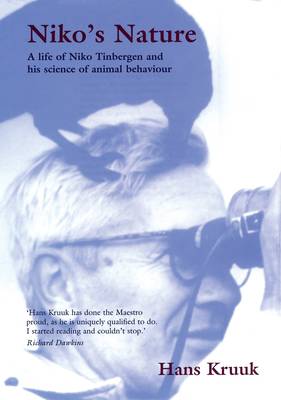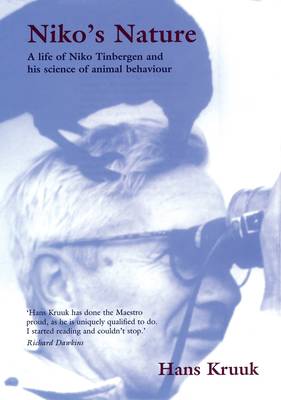
- Retrait gratuit dans votre magasin Club
- 7.000.000 titres dans notre catalogue
- Payer en toute sécurité
- Toujours un magasin près de chez vous
- Retrait gratuit dans votre magasin Club
- 7.000.0000 titres dans notre catalogue
- Payer en toute sécurité
- Toujours un magasin près de chez vous
Niko's Nature
The Life of Niko Tinbergen and His Science of Animal Behaviour
Hans Kruuk
Livre relié | Anglais
90,45 €
+ 180 points
Description
Here is the first biography of Niko Tinbergen, the brilliant but reticent naturalist (once described as "pathologically modest") who turned a passion for observing nature into a revolutionary new branch of science that illuminated the study of animal behavior.
Tracing the closely intertwined threads of Niko's personal and professional life, Hans Kruuk reveals the man behind the scientist. He shows how Niko's Calvinist upbringing in a highly intellectual Dutch family--his father was a much-published scholar, his elder brother a Nobel Laureate in Economics--the two-years he spent in a hostage camp during the Nazi occupation of Holland, and most importantly the magical year in Greenland, where he lived amongst the Inuit and observed animals in their natural habitat--an experience that would shape his scientific disposition. The period in Greenland set the stage for the groundbreaking experiments with free-living birds in the 1930s and 1940s that brought the study of animal behavior out of the laboratory and into the wild. Kruuk also offers an illuminating exploration of Niko's work with Konrad Lorenz, for which he won the Nobel Prize in 1973; his great success as a teacher at Oxford, where he was known by enthusiastic students--Desmond Morris, Richard Dawkins, and John Krebs, among them--as "The Maestro"; his frequent bouts of depression; the triumph of his book The Study of Instinct, which established ethology as a science; his controversial work on autism in children, and much more.
Written by Hans Kruuk, a former student of Niko Tinbergen and himself a distinguished scientist, Niko's Nature offers a fascinating and affectionate account of the man who forever changed the way we think about animal behavior.
Tracing the closely intertwined threads of Niko's personal and professional life, Hans Kruuk reveals the man behind the scientist. He shows how Niko's Calvinist upbringing in a highly intellectual Dutch family--his father was a much-published scholar, his elder brother a Nobel Laureate in Economics--the two-years he spent in a hostage camp during the Nazi occupation of Holland, and most importantly the magical year in Greenland, where he lived amongst the Inuit and observed animals in their natural habitat--an experience that would shape his scientific disposition. The period in Greenland set the stage for the groundbreaking experiments with free-living birds in the 1930s and 1940s that brought the study of animal behavior out of the laboratory and into the wild. Kruuk also offers an illuminating exploration of Niko's work with Konrad Lorenz, for which he won the Nobel Prize in 1973; his great success as a teacher at Oxford, where he was known by enthusiastic students--Desmond Morris, Richard Dawkins, and John Krebs, among them--as "The Maestro"; his frequent bouts of depression; the triumph of his book The Study of Instinct, which established ethology as a science; his controversial work on autism in children, and much more.
Written by Hans Kruuk, a former student of Niko Tinbergen and himself a distinguished scientist, Niko's Nature offers a fascinating and affectionate account of the man who forever changed the way we think about animal behavior.
Spécifications
Parties prenantes
- Auteur(s) :
- Editeur:
Contenu
- Nombre de pages :
- 406
- Langue:
- Anglais
Caractéristiques
- EAN:
- 9780198515586
- Date de parution :
- 18-03-04
- Format:
- Livre relié
- Format numérique:
- Genaaid
- Dimensions :
- 158 mm x 248 mm
- Poids :
- 889 g

Les avis
Nous publions uniquement les avis qui respectent les conditions requises. Consultez nos conditions pour les avis.






